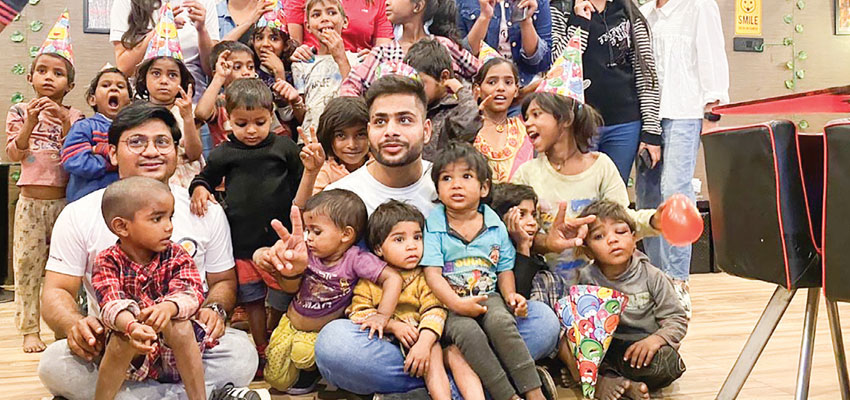Everything for others

In today’s fast-paced world, where people are often too busy to support even those close to them, there are still a few who dedicate their lives to the service of others. One such compassionate person is Ashish Kapoor, founder of the Neev Foundation and an MBA student at Sri Balaji University, Pune (SBUP). Committed to uplifting the underprivileged, he is helping them achieve their dreams. This is his story of what it means to be a Good Samaritan and how everyone can make a difference
The Sanskrit phrase Swasmai svalpam, samājāya sarvaswam (A little bit for yourself and everything for others) inspires him a lot, says Ashish, elaborating on his journey with Neev Foundation, an NGO he founded. With a strong desire to give back, Neev isn’t just helping people today—it’s shaping a better future for generations to come. Ashish proves that challenges can be turned into opportunities, not just for yourself but for others too.
The birth of Neev Foundation
Ashish comes from a background where even basic needs were hard to meet. His father, an auto driver, struggled financially, making it impossible for Ashish to fulfil his dream of studying in a convent school. These hardships fuelled his determination to create change, leading him to establish the Neev Foundation. “Looking at my own struggles, I always wanted to work for a social cause, to make others' lives better and ensure they don’t go through what I experienced,” he reflects.
Determined to turn his vision into reality, Ashish founded Neev in 2015, right after completing his Std XII. “I lacked both maturity and financial support at that time, but I was determined to help in any way I could,” he explains. In its early days, Neev focused on small yet meaningful contributions—donating old clothes, building shelters for stray animals, and offering assistance wherever financial resources weren’t required. A big help in his do-good cause, came from his five near-dear friends, who stood by Ashish through the foundation’s initial stages.
“I once overheard a conversation at a construction site about the importance of Neev, which means base or foundation, and how a deeper groundwork ensures a stronger structure. Similarly, I believe a better society can only be built by reaching deeper into people’s lives,” said Ashish. The term Neev – Ek Sunehra Kal signifys that a strong foundation ensures a brighter tomorrow.
Setbacks and breakthroughs
Despite his dedication to Neev, Ashish had his own personal struggles. To support himself, he worked as a delivery boy at a restaurant while continuing his studies. “My daily routine was exhausting—returning from college by 2 pm and then working at the restaurant from 5 pm to 11 pm,” he recalls. Later, securing a job at ICICI Prudential (Life Insurance) further occupied his time, leaving him unable to focus on the foundation.

However, Neev's journey didn't end there. In 2019, when the Covid-19 pandemic struck, the lockdown brought labour-intensive work to a halt, leaving daily-wage workers without an income. “Around my house, I saw labourers struggling for food, so we decided to distribute meals,” he explains.
As Ashish and his team started distributing food packages, their efforts gained widespread support on social media. “What began as 30 meals a day, quickly grew to nearly 500. At first, it was just a few of us, including my family and colleagues, distributing food. But, as more people learned about our work, they started contributing, allowing us to help even more,” said Ashish.
Neev expanded further and after the Covid pandemic, Ashish started working at HDFC Bank in Jaipur, where he launched the Jaipur Chapter of Neev Foundation. More recently, he established the Pune Chapter after moving there to pursue MBA at SBUP. “In its initial stage, the Pune Chapter is already receiving an encouraging response, with more volunteers joining us,” he shares.
Education as the core mission
Today, Neev has grown into a team of over 600 members, actively operating in Kota, Jaipur, and Pune. Since Ashish himself could not receive the education he once dreamed of, education has become the foundation's primary focus. “Neev sponsors the education of 28 children and runs ‘Neev Pathshala,’ a weekend roadside tuition initiative teaching basic literacy to around 50 children from slum areas across all three locations. Our aim is to spark their interest in learning and prepare them for formal education,” he explains.
Neev's working model is unique. They identify both, the potential donors, who are willing to contribute to society, and beneficiaries who lack financial stability and resources. Rather than collecting and redistributing funds, Neev acts as a mediator, directly connecting donors with those in need. “This ensures transparency, trust and credibility, in every transaction. Those interested in sponsoring a child's education can meet the beneficiaries firsthand and pay the school fees directly, eliminating concerns about misuse of funds,” said Ashish.
Neev attracts enthusiastic volunteers through social media and word-of-mouth. “I can’t be in all three cities at once, so I manage the chapter from where I currently reside, while trusted volunteers oversee the other chapters and report on activities at the end of each day,” Ashish adds.
"My vision is to provide free education, accommodation, and all necessary support to underprivileged children. But more than just academic success, my goal is to nurture responsible and compassionate individuals"
-Ashish Kapoor
Beyond education - serving society
Neev's impact extends beyond education. “We have served over 10,000 meals to date. This has only been possible due to the collective efforts of our volunteers and donors,” Ashish acknowledges. Additionally, Neev actively promotes menstrual hygiene awareness, particularly in schools and among daily-wage workers, and has distributed approximately 2,500 sanitary napkins so far.
Women working as daily-wage labourers often have to work even during their menstrual cycle, and the situation worsens when they rely on cloth instead of sanitary napkins, which can lead to infections and other health issues,” he explains. Notably, Neev’s menstrual hygiene drives involve both male and female volunteers, as Ashish believes in normalising the conversation around menstruation.
In collaboration with SBUP—where Ashish is currently studying—Neev recently launched Project P.A.D. (Period Awareness Drive). This initiative establishes a sanitary pad bank—collecting and distributing sanitary pads to government schools, slum areas, and those in need. Female volunteers will also educate beneficiaries about menstrual hygiene.
“We presented the project to our university’s administrative faculty, and they happily agreed to support it. The response from students has been overwhelming,” he says.
Above all, Ashish credits his parents for Neev’s success. “While they couldn’t support me financially, they never stopped me or imposed expectations on me. Their encouragement has been my greatest strength,” he says.
Recognition and achievements
Neev has received over a 100 awards, including recognition in the Asia Book of World Records for a 101-hour non-stop cleanliness drive in Kota. “We aimed for the record since no such achievement existed before. We reached out to the mayor and gathered volunteers through social media,” he recalls. Groups worked in shifts to sustain the effort for 101 hours. In addition to that, Neev received the Best Youth Influencer in Rajasthan (Social Service category) award from Union Minister Anurag Thakur, standing out among five shortlisted organisations dedicated to social causes.
A vision for the future
Ashish finds his greatest motivation in the smiles of those he has helped. He believes, true success isn’t measured by material wealth but by the lives he transforms. “Every night, I go to bed satisfied, knowing I’ve made a difference in someone’s life. While I couldn’t fulfil my own childhood dream of getting a good education, I am determined to help underprivileged children fulfil theirs,” he says.
Looking ahead, Ashish plans to open his own orphanage. “My vision is to provide free education, accommodation, and all necessary support to underprivileged children. But more than just academic success, my goal is to nurture responsible and compassionate individuals,” he concludes.